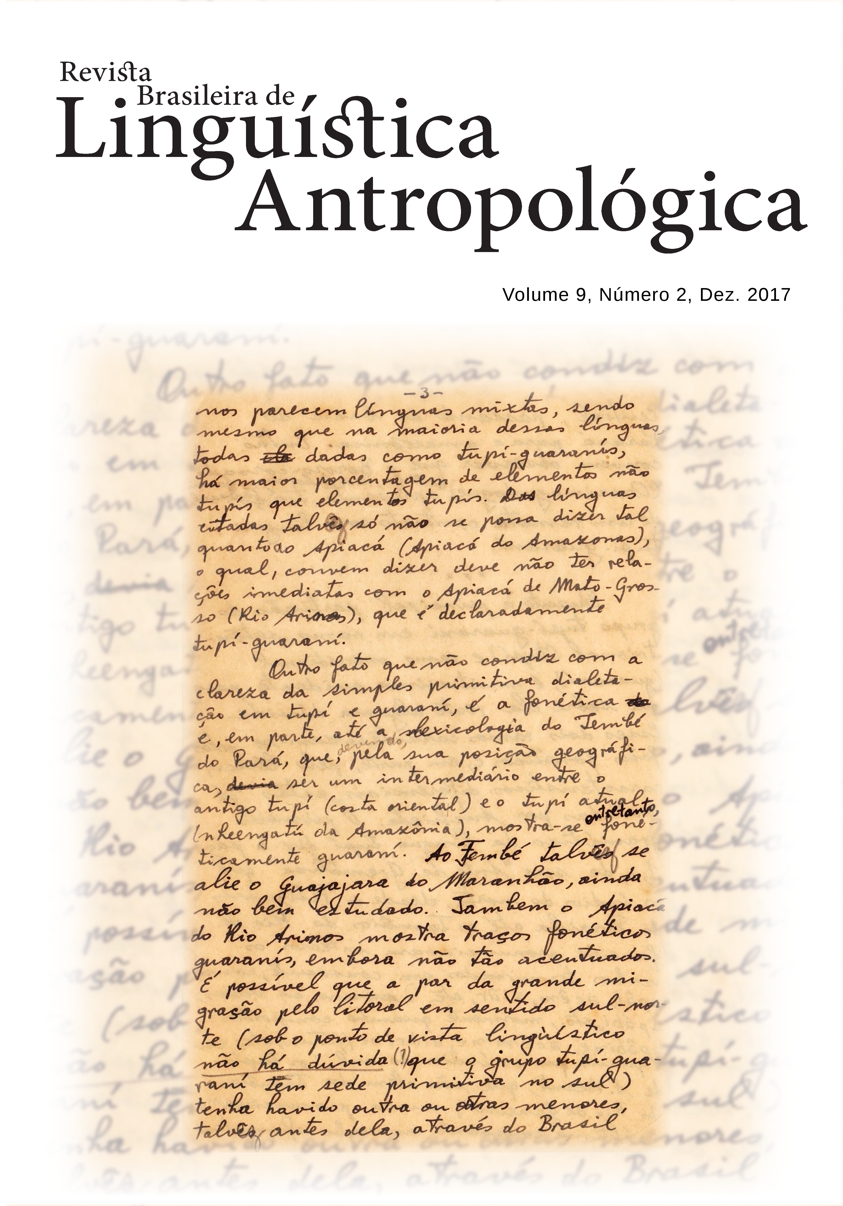Nomes de Parentesco da Língua Tembé: Problemas de Tradução
DOI:
https://doi.org/10.26512/rbla.v9i2.19085Keywords:
Tembé language. Tupí-Guaraní family. Lexicography. Translation. Indigenous Languages.Abstract
We deal with the translation of kinship terms from the Tembé language to Brazilian Portuguese, in particular, kinship terms related to 1st and 2nd degree blood relatives - father, mother, children, siblings, grandparents, grandchildren, uncles, cousins and nephews. The data source for this study is the doctoral dissertation of Tabita Silva (2010), which presents examples of names of this semantic field, as well as a lexical comparative table of kinship names in Tembé and Guajajára, collected by this author, from 2006 to 2009; the Portuguese-Tembé Bilingual Dictionary of Max Boudin (1978); and the Dissertation of Marcia Carvalho (2001), which presents a record of the speech of the elders. We investigate kinship names of Tembé, aiming their translation into Portuguese. We show that kinship terms in Tembé, as well other terms of this language, have specificities when compared to Portuguese, demanding special attention from the translator.
References
Berman, Antoine. 2013. A Tradução e a Letra ou o Albergue do Longínquo. Tradução: Marie-Hélène C. Torres, Mauri Furlan e Andreia Guerini. 2 ed. Tubarão: Copiart; Florianópolis: PGET/UFSC, 200 p. Título original: La traduction et la lettre ou l’auberge du lointain.
Boudin, Max H. 1978. Dicionário de Tupí Moderno (dialeto Tembé-Ténêtéhar do alto rio Gurupi). v. 2. São Paulo: Conselho Estadual de Artes e Ciências Humanas.
Cabral, Ana Suelly Arruda Câmara. 2000. Algumas observações sobre a história social da Língua Geral Amazônica. In.: SIMÕES, Maria do Socorro. Memória e Comunidade: entre o rio e a floresta. Belém: Gráfica Universitária/ UFPA, p. 103-129.
Carvalho, Marcia Goretti Pereira de. 2001. Sinais de morte ou de vitalidade? Mudanças estruturais na Língua Tembé: Contribuição ao estudo dos efeitos de contato linguístico na Amazônia Oriental, 2001. 120 f. Dissertação (Mestrado em Letras) ”“
Curso de Pós-Graduação em Letras. Universidade Federal do Pará, Centro de Letras e Artes, Belém, 2001. Disponível em . Acesso em 3 nov. 2016.
Galvão, Eduardo. 1978. Encontro de sociedades. Rio de Janeiro: Editora Paz e Terra.
Gomes, Mércio Pereira. 2002. O índio na história: O povo Tenetehara em busca da liberdade. Petrópolis: Editora Vozes.
Martín, Carmen Ávila. 2014. Las relaciones entre lengua y cultura em el ámbito lexicográfico. Universidade de Coruña: Revista de Lexicografía, n. 26:37-48.
Niranjana, Tejaswini. 1992. Representing Texts and Cultures. In: History, PostStructuralism and the Colonial Context. Siting Translation. Berkeley: University of California Press, p. 47-86.
Rocha, Everardo P. Guimarães. 2006. O que é etnocentrismo. São Paulo: Editora Brasiliense. Coleção Primeiros Passos.
Rodrigues, Aryon Dall’Igna. 1985. Relações internas na família linguística TupíGuaraní. Revista de Antropologia. São Paulo, n. 27/28:33-53.
_________. 2000. Caso em Tupí-Guaraní, particularmente em Tupinambá. In: Congresso da ANPOLL 13, Niterói: ANPOLL.
Silva, Tabita Fernandes. 20010. História da Língua Tenetehára: Contribuição aos Estudos histórico-comparativos sobre a diversificação da Família linguística Tupí-Guaraní do Tronco Tupí. 2010. 1252 f. Tese (Doutorado em Linguística) ”“ Curso de Pós-Graduação em Linguística. Universidade de Brasília, Instituto de Letras, Brasília. Disponível em: . Acesso em 3 nov. 2016.
Downloads
Published
Issue
Section
License
Copyright (c) 2018 Revista Brasileira de Linguística Antropológica

This work is licensed under a Creative Commons Attribution 4.0 International License.
Authors who publish in RBLA agree to the following terms:
a) Authors maintain the copyright and grant the journal the right of first publication, and the work is simultaneously licensed under the Creative Commons Attribution License, which allows the sharing of the work with recognition of the authorship of the work and initial publication in this journal.
b) Authors are authorized to assume additional contracts separately, for non-exclusive distribution of the version of the work published in this journal (eg, publish in an institutional repository or as a book chapter), with recognition of authorship and initial publication in this journal.
c) Authors are allowed and encouraged to publish their work online (eg, in institutional repositories or on their personal page) at any point before or during the editorial process, as this can generate productive changes, as well as increase impact and citation of the published work.







